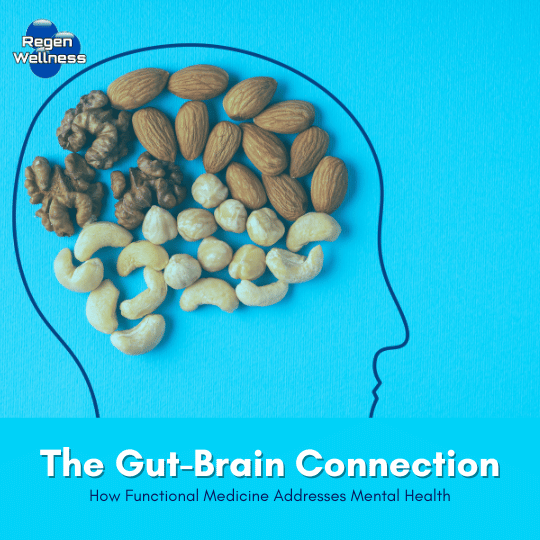There is a growing body of evidence that suggests the gut and brain are linked, and this connection heavily impacts our mental health. Functional medicine takes this research into account by using diet, lifestyle interventions, and nutritional supplementation to address mental illness.
There is a growing body of evidence that suggests the gut and brain are linked, and this connection heavily impacts our mental health. Functional medicine takes this research into account by using diet, lifestyle interventions, and nutritional supplementation to address mental illness.
One major aspect of functional medicine is its focus on gut health. The gut contains 70–80% of your immune system and produces many of the neurotransmitters that regulate mood. Dysfunction in this area can result in digestive issues, inflammation, and an increased risk for mental health problems like depression and anxiety. In this article, we'll take a look at how gut health impacts mental health, signs you should look for, and how to ensure your gut stays healthy.
What is Functional Medicine?
Functional medicine seeks to address the underlying causes of mental health issues like anxiety and depression. It takes a holistic approach, looking at lifestyle factors such as diet, exercise, sleep habits, stress levels, environmental toxins, and genetics. By making changes in these areas, it can help restore balance in the body's systems and thus improve overall mental health
Functional medicine starts with a detailed clinical assessment of the patient’s current state. It looks at diet, lifestyle, environment, thorough lab work, genetics/epigenetics, and past medical history to get an overall picture of their physical and psychological well-being. This holistic approach allows practitioners to tailor treatments specific to each individual’s needs.
The Connection Between Gut Health & Mental Health
By looking at the gut-brain connection, functional medicine practitioners are able to address both physical and psychological symptoms through diet and lifestyle changes. There's a saying that the gut is the second brain. This is because the gut is home to a vast array of bacteria. These microbes produce neurotransmitters, which are chemical messengers that signal between brain cells and influence mood, anxiety, and depression.
There's also evidence that suggests the microbiome (the collection of microorganisms living in our bodies) can influence mental health by affecting inflammation levels. Inflammation occurs when the immune system responds to an injury or infection, but it can also be caused by stress, poor diet, and environmental toxins. When inflammation levels are high for prolonged periods of time, this can lead to chronic health problems like depression and anxiety.
By addressing gut health through functional medicine, practitioners can help reduce inflammation as well as balance gastrointestinal bacteria. This can have a significant impact on mental health, as it allows the body to better regulate neurotransmitters and reduce inflammation.
Signs and Symptoms of an Unhealthy Gut
If you're experiencing digestive issues such as bloating, diarrhea, constipation, or abdominal pain along with anxiety or depression, this could be an indication of gut-brain imbalance. Other signs include chronic fatigue, headaches, skin issues like eczema and acne, food sensitivities/allergies, brain fog, and poor sleep.
Other symptoms of poor gut health include nutrient deficiencies, poor circulation, and low immunity. These can all lead to a decrease in mental clarity and focus as well as an increased risk for chronic illness such as leaky gut and autoimmune diseases. If you think you're experiencing symptoms of an unhealthy gut, it's important you consult with a functional medicine clinic like Regen IV Wellness. With proper testing, consultation, and a customized health plan, you can reverse the effects of poor gut health.
Ways To Improve Gut Health
Functional medicine uses diet and lifestyle interventions to address health issues. This includes eliminating inflammatory foods (such as processed sugar and refined carbohydrates), avoiding environmental toxins (including chemicals in cosmetics and household products), and adding in probiotic rich foods (such as yogurt, kefir, sauerkraut, kimchi, and miso).
The good news is that there are many things you can do to improve your gut health. Here are some tips:
- Eat a variety of healthy foods including fruits, vegetables, whole grains, nuts/seeds, lean proteins and healthy fats such as olive oil.
- Avoid processed foods with artificial ingredients and preservatives.
- Limit sugary foods and drinks as well as caffeine.
- Manage stress levels through activities like yoga, meditation, journaling or simply taking time out for yourself each
Studies have found that reducing inflammatory foods like sugar and processed grains can reduce stress levels.
Supplements for Gut Health
An easy way to improve gut health is by starting a daily supplement regimen designed to support and improve the health of your gut. While a customized supplement regimen from Regen IV Wellness is the best and most effective route to ensuring a healthy gut, incorporating supplements like probiotics may help rebalance gut bacteria which has been linked to improved moods. Nutritional supplements like omega-3 fatty acids and B vitamins can also help improve neurological function by providing essential nutrients for brain health.
Additionally, Regen IV Wellness offers peptide therapy that has been proven to improve gut health and reverse signs of leaky gut syndrome. To learn more about peptide therapy and how it can help heal your gut, you can visit our BPC-157 page for more details.
There are a variety of treatment options that can help you improve gut health. Other therapies that can be used are stress management techniques such as yoga or meditation; movement like walking or running; adequate sleep; and positive lifestyle habits. Incorporating a combination of these changes can have a huge impact on your gut health. The best thing is you don't have to do them all or all at once. Simply start with one and add on another until you've established consistent, healthy habits
Conclusion
Functional medicine is a holistic approach to health that takes into account the complex relationship between the gut and brain. By looking at both physical and psychological elements, practitioners are able to create tailored treatments that address the underlying causes of mental illness. With this approach, it is possible to achieve lasting improvements in mental health and overall well-being.
By following a comprehensive health plan tailored to your specific needs, you'll be able to improve your overall mental health as well as your gut health. With proper care and nourishment, your gut can become an ally in protecting both physical and psychological wellbeing. Start today by consulting with our functional medicine team at Regen IV Wellness to get on a path to improved health! Schedule a FREE consult today!
Sources:
https://www.ncbi.nlm.nih.gov/pmc/articles/PMC4367209/#:~:text=The%20gut%2Dbrain%20axis%20(GBA,microbiota%20in%20influencing%20these%20interactions.
https://blogs.flinders.edu.au/student-health-and-well-being/2023/01/30/the-role-of-lifestyle-factors-in-mental-health/#:~:text=Mental%20health%20clinicians%20have%20been,smoke%20or%20use%20drugs%2Falcohol.
https://www.optum.com/health-articles/article/healthy-mind/surprising-link-between-your-microbiome-and-mental-health/





